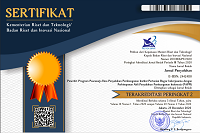Faktor-faktor yang Mempengaruhi Dinamika Kelompok dan Hubungannya dengan Kelas Kemampuan Kelompok Tani di Desa Pulokencana Kabupaten Serang
Abstract
Group dynamics is an important factor in the development offarmers' groups. The aims of this study is to know the differences between of farmer group dynamics which includes highest class with lowest class. The results showed that there was no relationship between class ability of farmer groups with the level of group dynamics. Capability class of farmers group evaluation which undertaken in the village Pulokencana only based on an assessment of the head of farmers group and age of group only.The fact that Banjar Tani group is more dynamic than the Banyu Mukti group, but the class between that two groups very different, Banyu Mukti is Main class while the Banjar Tani is Beginners class. Factors that affect the group dynamics are land area, family size, age of group leader and age of farmer groups, and the reception of members of the group leader. In addition, the eight elements of group dynamics, only two elements that do not affect the group dynamics, namely the element of group objective and group pressure. Meanwhile, the six elements that influence group dynamics, the task function has the strongest influence on the dynamics of farmer groups.
Keywords: farmer group, group dynamics
Downloads
Authors who publish with this journal agree to the following terms:
- Authors retain copyright and grant the journal right of first publication with the work simultaneously licensed under a

This work is licensed under a Creative Commons Attribution 4.0 International License that allows others to share the work with an acknowledgement of the work's authorship and initial publication in this journal. - Authors are able to enter into separate, additional contractual arrangements for the non-exclusive distribution of the journal's published version of the work (e.g., post it to an institutional repository or publish it in a book), with an acknowledgement of its initial publication in this journal.
- Authors are permitted and encouraged to post their work online (e.g., in institutional repositories or on their website) prior to and during the submission process, as it can lead to productive exchanges, as well as earlier and greater citation of published work (See The Effect of Open Access).















